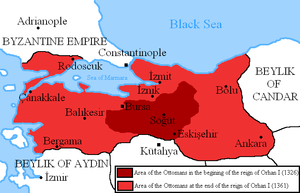
LIFE
First Sultan Murad was born in Bursa in 1326.Orhan Gazi father, his mother is Nilufer Hatun."Monarch", "Bey" meaning Hüdavendigar name was given.First Sultan Murad tall, round faced and big nose.Thick and muscular body had.Very simply dressed and was interested in a white dress with red ground.Received initial training from his mother Nilüfer Hatun.Then, science and art people lived in Bursa.Scholars and artists show their reverence to the poor and homeless with compassion would behave.First Sultan Murad, his whole life was planned and programmed movement.First Sultan Murad, according to the Byzantine Church was known as a heretic and enemy of Jesus.But He was good for Christians.
 |
| Map of the conquests of Murad I |
Murad fought against the powerful emirate of Karaman in Anatolia and against the Serbs, Albanians,Bulgarians and Hungarians in Europe. In particular, a Serb expedition to expel the Turks from Adrianople led by the Serbian brothers King Vukašin and Despot Uglješa, was defeated on September 26, 1371, by Murad's Murat capable second lieutenant Lala Şâhin Paşa, the first governor (beylerbey) of Rumeli. In 1385Sofia fell to the Ottomans. In 1386 Prince Lazar Hrebeljanović defeated an Ottoman force at the Battle of Pločnik. The Ottoman army suffered heavy casualties, and was unable to capture Niš on the way back
BATTLE OF KOSOVO
In 1389 Murad's army defeated the Serbian Army and its allies under the leadership of Lazar at the Battle of Kosovo. There are different accounts from different sources about when and how Murad I was assassinated. The contemporary sources mainly noted that the battle took place and that both Prince Lazar and the Sultan lost their lives in the battle. The existing evidence of the additional stories and speculations as to how Murad I died were disseminated and recorded in the 15th century and later, decades after the actual event. One Western source states that during first hours of the battle, Murad I was assassinated by Serbian nobleman and knight Miloš Obilić by knife.Most Ottoman chroniclers (including Dimitrie Cantemir) state that he was assassinated after the finish of the battle while going around the battlefield. Others state that he was assassinated in the evening after the battle at his tent by the assassin who was admitted to ask a special favour. His older son Bayezid, who was in charge of the left wing of the Ottoman forces, took charge after that. His other son, Yakub Bey, who was in charge of the other wing, was called to the Sultan's command center tent by Bayezid, but when Yakub Bey arrived he was strangled, leaving Bayezid as the sole claimant to the throne.
In the earliest preserved Christian record, a letter of Florentine senate to the King Tvrtko I of Bosnia, dated 20 October 1389, Murad I's killing was described. A warrior, allegedly Miloš Obilić, had managed to get through the Ottoman army and kill Murad I.
Sultan Murad's internal organs were buried in Kosovo field and remains to this day on a corner of the battlefield in a location called Meshed-i Hudavendigar which has gained a religious significance by the Muslims (which had been renamed Obilić by the Serbs). It has recently been renovated. His other remains were carried to Bursa, his Anatolian capital city, and were buried in a tomb at the complex built in his name.
Of his reign to be evaluated
I. Ottoman Sultan Murad on the first monarch is known for his nickname.Has made 37 major combat in Anatolia and Rumelia, and all of them have ended in victory.Beautiful speech, cengaverlig and hunt from addiction has been mentioned.Before the start of his fiery collision pep speech to the army is still rumor.Foreign sources it "polite knight" as they mention.Has increased the number of vizier. Has increased the number of members of the Court.Fiscal authorities have been established.The era's most advanced professional military organization, which was founded Janissary.




